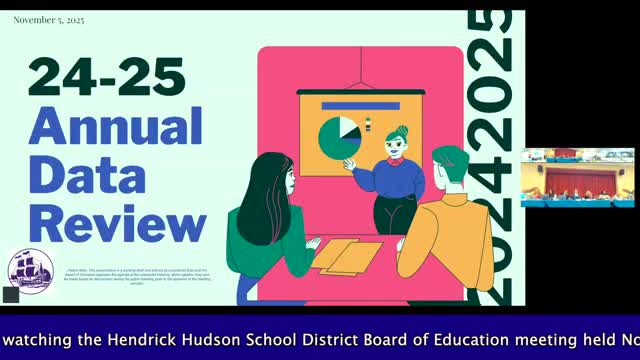District presents preliminary 2024–25 assessment data; board presses for cohort and item analyses
Get AI-powered insights, summaries, and transcripts
Subscribe
Summary
Assistant Superintendent Lauren Stallings and assessment lead Ms. Scollins presented preliminary 2024–25 results and cautioned that New York State had not yet certified official school report cards.
At the Nov. 5 Hendrick Hudson Board meeting, Assistant Superintendent for Curriculum, Instruction and Assessment Lauren Stallings and assessment lead Ms. Scollins presented preliminary 2024–25 assessment data and a plan for district follow‑up.
Stallings opened by warning that “those results represent only 1 data point in time” and that New York State had not yet posted final school report card figures. Ms. Scollins said the district will return in January for a midyear review after state certification and asked the public to submit questions via a linked Google form so staff can tailor the January presentation.
Key technical points presented and discussed: - Accountability indicators: the district monitors proficiency and growth (grades 3–8 ELA/math), English‑learner proficiency targets, chronic absenteeism, high‑school graduation rate and college/career readiness. Scollins said the state assigns indicator levels and district comparisons are pending state reports. - Cohort analysis: staff showed cohort trend slides that track the same students over time (for example, ELA performance from grades 5–8) and said cohort tracking will inform transition supports between grade levels. - Algebra 1 and course changes: Scollins noted a change in course structure: algebra 1a/1b was introduced and fewer students took the Algebra 1 Regents in 2025 (146 students in 2024 vs. 126 in 2025). A board member cited an 18% mastery figure for Algebra 1 and trustees asked for item‑level analyses and targeted MTSS interventions. - Advanced Placement and dual credit: AP Psychology test takers declined from 58 in 2024 to 15 in 2025 after the district partnered with SUNY Potsdam to offer college credit as an alternative. - Attendance reporting: staff explained state reporting collapses reasons into present/absent and excludes kindergarten; the board asked for standardized local attendance codes and for district staff to analyze absence reasons across buildings.
Board members pressed for actionable next steps: principals will present more site‑level examples in January, the district will perform item analyses to revise instruction, and staff will report back on MTSS data and targeted supports. No formal board action was taken; the presentation concluded with an agreement to reconvene in January with certified state data and deeper cohort analyses.
